Losing weight with insulin resistance can be challenging, but it’s not impossible. Insulin resistance makes it harder for your body to use glucose for energy, leading to weight gain and other health issues. A combination of diet changes, regular exercise, and lifestyle adjustments can help you lose weight and improve insulin sensitivity.
 [1]
[1]Introducing Sugar Defender[2], an advanced blend of 24 proven ingredients supporting healthy glucose levels and natural weight loss.
Many people with insulin resistance struggle to shed pounds despite their best efforts. This frustration is common, but there are effective strategies to overcome it. Weight loss significantly improves all aspects of metabolic syndrome[4], including insulin resistance.
By focusing on the right foods, increasing physical activity, and making smart lifestyle choices, you can start seeing results. These changes not only help with weight loss but also improve your overall health and reduce the risk of related conditions like heart disease.
Key Takeaways
- Balanced diet and regular exercise are crucial for weight loss with insulin resistance
- Lifestyle changes can improve insulin sensitivity and support weight management
- Consistent efforts lead to better blood sugar control and overall health improvements
Understanding Insulin Resistance and Weight Loss
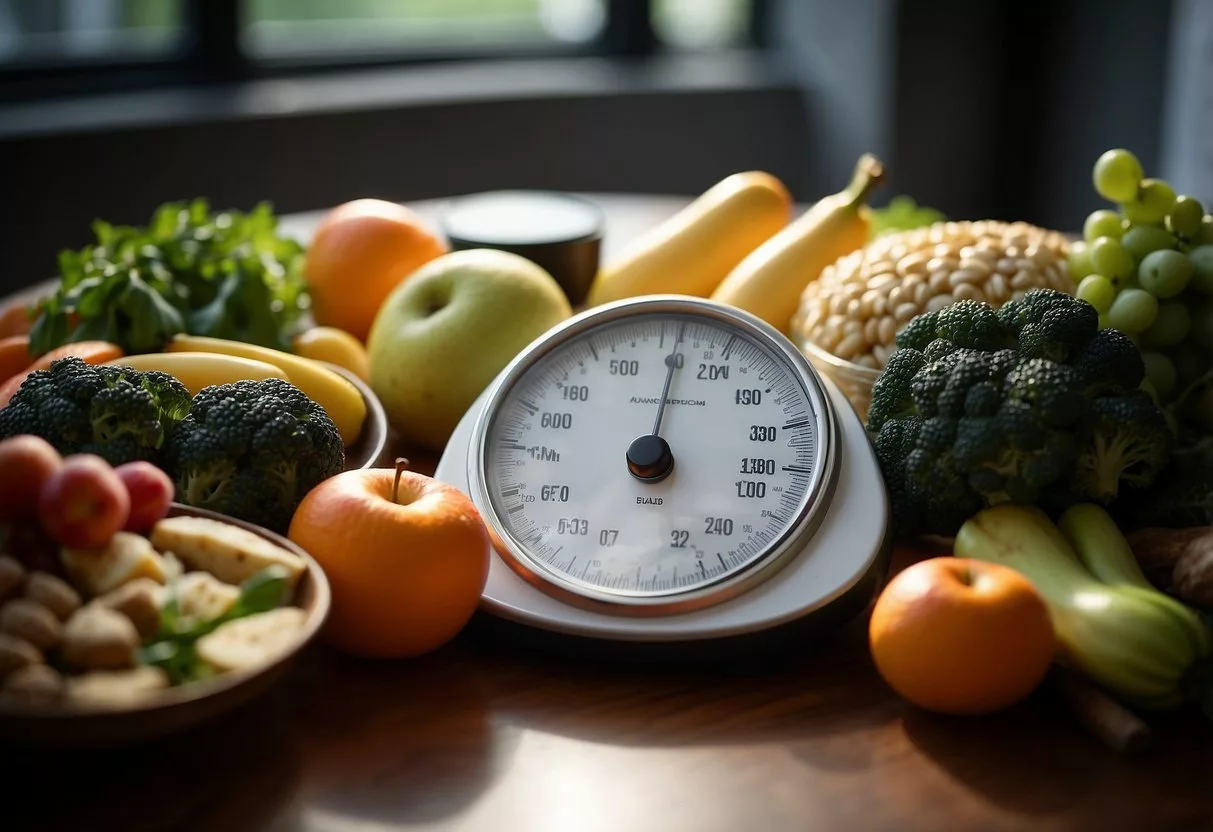
Insulin resistance plays a key role in weight gain and makes losing weight more challenging. It affects how the body processes glucose and stores fat.
The Role of Insulin in the Body
Insulin is a hormone made by the pancreas. It helps cells absorb glucose from the bloodstream. When we eat, blood sugar levels rise. The pancreas releases insulin in response.
Insulin tells cells to take in glucose for energy. It also signals the liver to store extra glucose as glycogen. This process keeps blood sugar levels stable.
Insulin affects fat storage too. It tells fat cells to take in fatty acids from the blood. This leads to fat storage in the body.
The Link Between Insulin Resistance and Obesity
Insulin resistance often goes hand-in-hand with obesity[5]. In this state, cells don’t respond well to insulin. The body makes more insulin to try to lower blood sugar.
High insulin levels make it hard to burn fat. The body stores more fat instead. This leads to weight gain.
Excess body fat, especially around the belly, can worsen insulin resistance. This creates a cycle that’s hard to break.
Impacts of Insulin Resistance on Metabolism
Insulin resistance changes how the body uses energy. It becomes harder to burn fat for fuel. The body relies more on carbs for energy instead.
This shift slows metabolism. It makes losing weight more difficult. The body tends to store calories as fat rather than burn them.
Insulin resistance can lead to high blood sugar. This can damage blood vessels over time. It may cause fatigue and increase hunger.
Diabetes, Prediabetes, and Weight Management
Type 2 diabetes develops when insulin resistance gets worse[6]. The pancreas can’t make enough insulin to control blood sugar. This leads to high blood glucose levels.
Prediabetes comes before type 2 diabetes. Blood sugar levels are higher than normal, but not yet diabetic. Both conditions make weight loss harder.
Losing weight can improve insulin sensitivity. Even a small amount of weight loss helps. It can lower the risk of developing type 2 diabetes.
Diet and exercise are key for managing weight with these conditions. They help improve how cells respond to insulin. This makes it easier to lose weight and control blood sugar.
Dietary Strategies for Managing Insulin Resistance
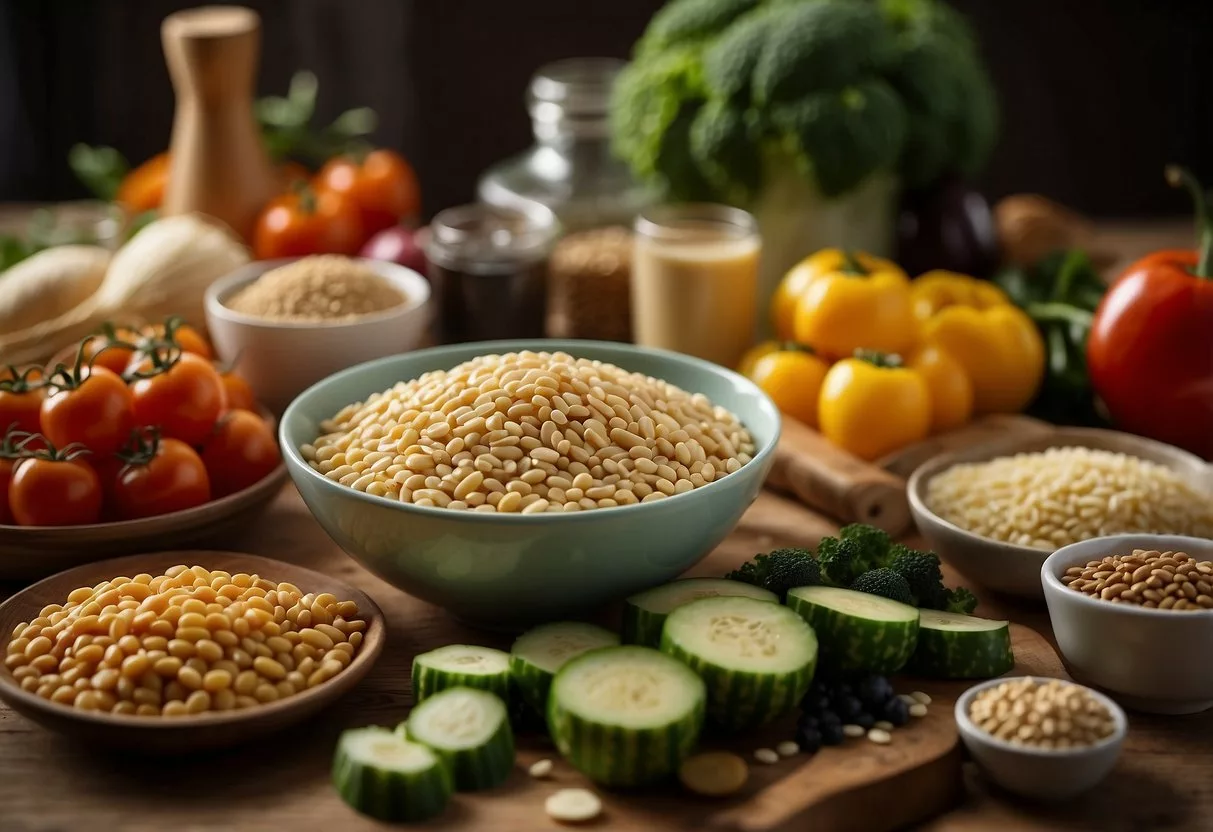
Eating the right foods can help manage insulin resistance and promote weight loss. A balanced diet with specific nutrients is key to improving insulin sensitivity and blood sugar control.
Macronutrients and Insulin Resistance
Balancing macronutrients is crucial for managing insulin resistance. Protein helps build muscle and keeps you full. Aim for lean sources like chicken, fish, and tofu.
Carbohydrates affect blood sugar the most. Choose complex carbs that digest slowly. Limit simple sugars and refined grains.
Fat doesn’t raise blood sugar directly, but too much can worsen insulin resistance. Focus on healthy fats from olive oil, avocados, and nuts.
A good balance is 40-50% carbs, 20-30% protein, and 20-30% fat. This mix helps control blood sugar and insulin levels.
Choosing the Right Carbohydrates
Not all carbs are equal when it comes to insulin resistance. Whole grains[7] like brown rice and quinoa are better choices. They digest slowly and don’t spike blood sugar.
Fruits contain natural sugars but also fiber and nutrients. Berries are especially good. They’re low in sugar and high in antioxidants.
Avoid added sugars in processed foods and drinks. These cause rapid blood sugar spikes. Read labels carefully to spot hidden sugars.
Starchy vegetables like potatoes can raise blood sugar quickly. Non-starchy options like broccoli, spinach, and peppers are better choices.
The Importance of Dietary Fiber
Fiber is crucial for managing insulin resistance. It slows digestion and helps control blood sugar. Aim for at least 25-30 grams per day.
Soluble fiber is especially helpful. It forms a gel in the gut that slows sugar absorption. Good sources include oats, beans, and apples.
Insoluble fiber adds bulk to stool and aids digestion. It’s found in whole grains, nuts, and many vegetables.
High-fiber foods also help you feel full longer. This can lead to eating less and losing weight. Weight loss itself can improve insulin sensitivity.
Incorporating Healthy Fats into Your Diet
Not all fats are bad for insulin resistance. Healthy fats[6] can actually improve insulin sensitivity. Focus on unsaturated fats from plants and fish.
Omega-3 fatty acids are especially beneficial. They reduce inflammation and improve cell function. Eat fatty fish, like salmon, twice a week. Plant sources include flaxseeds and walnuts.
Avocados are rich in healthy monounsaturated fats. They also contain fiber and potassium. Add them to salads or use as a spread.
Limit saturated fats from red meat and full-fat dairy. These can worsen insulin resistance. Choose lean meats and low-fat dairy instead.
Meal Planning for Balanced Blood Sugar
Planning meals ahead helps maintain steady blood sugar. Aim for 3 balanced meals and 2-3 small snacks daily.
Include protein, fiber, and healthy fat at each meal. This slows digestion and prevents blood sugar spikes.
Start the day with a high-fiber breakfast. Oatmeal with berries and nuts is a good choice. It provides steady energy all morning.
For lunch and dinner, fill half your plate with non-starchy vegetables. Add a quarter plate each of lean protein and whole grains.
Snack on foods that combine protein and fiber. Try an apple with almond butter or Greek yogurt with berries. These keep you full and stabilize blood sugar.
Exercise and Physical Activity for Insulin Resistance

Exercise and physical activity play a key role in managing insulin resistance. Regular movement helps lower blood sugar, boosts energy, and improves how muscles use glucose.
The Benefits of Regular Exercise
Regular physical activity reduces the risk[8] of insulin resistance and type 2 diabetes. Exercise helps muscles absorb glucose more efficiently, even without insulin. This lowers blood sugar levels naturally.
Working out also increases energy and stamina. It burns calories and helps with weight loss, which further improves insulin sensitivity.
Exercise boosts overall health too. It strengthens the heart, builds muscle, and enhances mood. For those with insulin resistance, these benefits are especially important.
Types of Exercise for Improving Insulin Sensitivity
Both aerobic exercise and strength training help insulin resistance. Aerobic activities like walking, swimming, or cycling improve heart health and burn calories.
Strength training builds muscle mass. More muscle means better glucose uptake. Try exercises like:
- Bodyweight squats
- Push-ups
- Lunges
- Dumbbell rows
Aim for at least 150 minutes of moderate exercise per week. This can be broken up into 30-minute sessions 5 days a week.
High-intensity interval training (HIIT) is also effective. It involves short bursts of intense activity followed by rest periods.
Exercise Considerations for Individuals with Insulin Resistance
Start slowly if you’re new to exercise. Gradually increase intensity and duration over time. This helps prevent injury and burnout.
Check blood sugar levels[9] before and after workouts. This helps you understand how exercise affects your body.
Stay hydrated during workouts. Drink water before, during, and after exercise.
Choose activities you enjoy. This makes it easier to stick to a routine. Try different types of exercise to find what works best for you.
Always consult a doctor before starting a new exercise program. They can provide personalized advice based on your health status.
Behavioral and Lifestyle Modifications

Changing daily habits can help manage insulin resistance and promote weight loss. Key areas to focus on include stress reduction, sleep quality, and building a strong support network.
Stress and Its Role in Insulin Resistance
Chronic stress can make it harder to lose weight with insulin resistance[10]. When stressed, the body releases cortisol, which can increase blood sugar and insulin levels.
To manage stress:
- Practice deep breathing or meditation daily
- Exercise regularly
- Take up a relaxing hobby
Keeping a stress journal can help identify triggers. This allows a person to plan ahead and avoid or better handle stressful situations.
The Impact of Sleep on Weight Management
Good sleep is crucial for weight loss and insulin sensitivity[11]. Lack of sleep can disrupt hormones that control hunger and fullness.
Tips for better sleep:
- Stick to a regular sleep schedule
- Create a relaxing bedtime routine
- Keep the bedroom cool and dark
Aim for 7-9 hours of sleep per night. Avoiding screens before bed can improve sleep quality.
Importance of Support Systems
Having support makes it easier to stick to lifestyle changes[12]. Friends, family, or support groups can provide encouragement and accountability.
Ways to build a support system:
- Join a weight loss group
- Find a workout buddy
- Share goals with close friends or family
Online communities can also offer support and tips. Regularly connecting with supportive people boosts motivation and success in managing weight and insulin resistance.
Medical Interventions and Monitoring

Managing insulin resistance often requires a mix of lifestyle changes and medical treatments. Regular check-ups and monitoring are key parts of an effective plan. Medication may be needed in some cases to improve insulin sensitivity.
When to Consider Medication
If diet and exercise alone don’t improve insulin resistance, a doctor may suggest medication. This usually happens when blood glucose levels[7] stay high despite lifestyle changes. Medication can help lower the risk of diabetes and heart disease.
Some signs that medication might be needed include:
- Fasting blood sugar above 100 mg/dL
- A1C levels over 5.7%
- High blood pressure
- Trouble losing weight
A doctor will look at a person’s overall health before prescribing any drugs. They may also check for other conditions linked to insulin resistance.
Understanding and Using Metformin
Metformin is often the first medication[13] prescribed for insulin resistance. It works by making the body more sensitive to insulin. This helps lower blood sugar levels.
Key facts about metformin:
- It’s taken orally, usually with meals
- Common side effects include stomach upset and diarrhea
- It may help with weight loss
- It’s generally safe and well-tolerated
Doctors typically start with a low dose and increase it slowly. This helps reduce side effects. Metformin works best when combined with a healthy diet and regular exercise.
The Importance of Regular Health Check-ups
Regular check-ups are vital for managing insulin resistance. They help track progress and catch any problems early. A typical check-up might include:
- Blood tests to measure glucose and A1C levels
- Blood pressure check
- Weight and waist measurement
- Discussion of symptoms and side effects
Doctors may use continuous glucose monitors[14] to get a more complete picture of blood sugar patterns. These devices can help adjust treatment plans.
Seeing a dietitian can also be helpful. They can create meal plans that work with any prescribed medications. Regular check-ups allow for timely adjustments to treatment as needed.
Eating Habits and Patterns
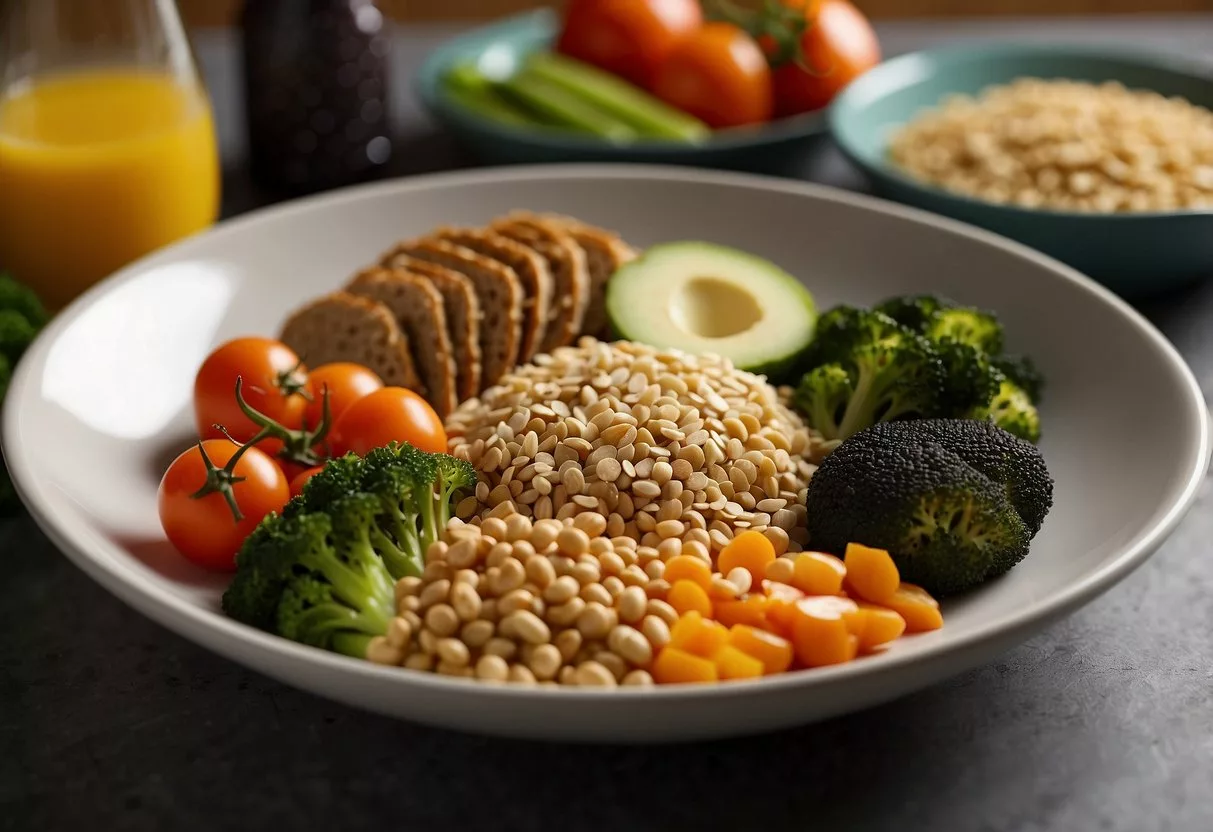
Good eating habits play a big role in managing weight with insulin resistance. Smart food choices and meal timing can help control blood sugar and support weight loss goals.
Importance of Consistent Meal Times
Eating at regular times each day helps keep blood sugar stable. This makes insulin work better. Try to eat breakfast, lunch, and dinner at set times. Space meals 4-5 hours apart.
Add 1-2 small snacks if needed. Good snack options include:
- A small apple with almond butter
- Carrot sticks and hummus
- Greek yogurt with berries
Avoid skipping meals. This can lead to big blood sugar swings and overeating later.
Mindful Eating and Portion Control
Pay attention to hunger cues. Eat slowly and stop when full. Use smaller plates to control portions. Fill half the plate with non-starchy veggies. Add lean protein and whole grains.
Try this simple portion guide:
- Protein: Palm-sized portion
- Grains/Starches: 1/2 cup or size of a fist
- Veggies: 1-2 cups or more
- Fruit: 1 small piece or 1/2 cup
Measure foods at first to learn proper serving sizes. Over time, eyeballing portions gets easier.
Navigating Eating Out and Social Situations
Eating out can be tricky with insulin resistance. Look at menus ahead of time when possible. Choose grilled or baked items instead of fried. Ask for dressings and sauces on the side.
At parties, scan all food options first. Fill most of the plate with veggies and lean proteins. Take small tastes of treats. Eat slowly and chat between bites.
Bring a healthy dish to share at gatherings. This ensures there’s a good option available. Don’t be afraid to politely decline foods that don’t fit your meal plan.
Supplements and Additional Nutrients
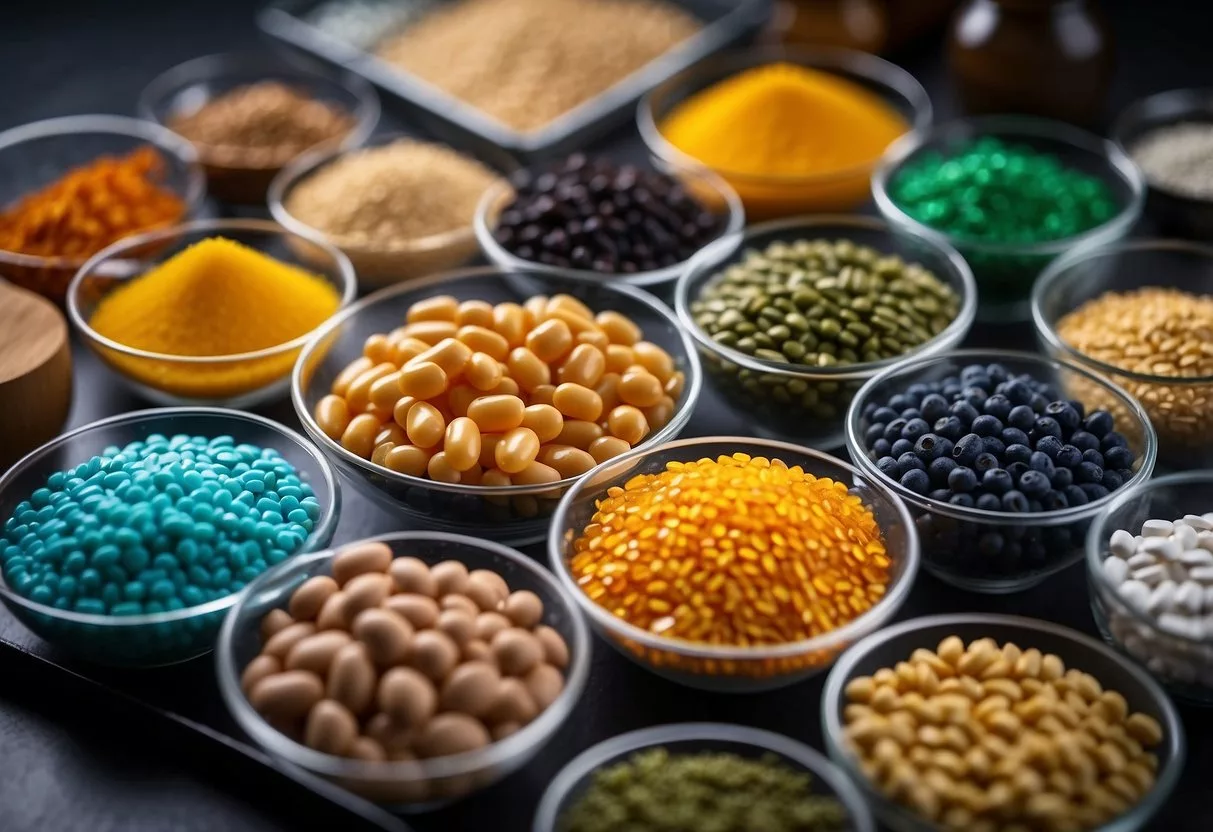
Certain vitamins, minerals, and natural supplements can help manage insulin resistance and support weight loss efforts. These nutrients work to improve insulin sensitivity and boost metabolism.
Vitamins and Minerals for Insulin Resistance
Vitamin D plays a key role in insulin function. Low levels are linked to insulin resistance. The American Diabetes Association[15] suggests getting enough vitamin D through sunlight, food, or supplements.
Chromium helps insulin work better in the body. It can be found in whole grains, broccoli, and lean meats. Some people may benefit from chromium supplements.
Magnesium is important for insulin action. Good sources include leafy greens, nuts, and seeds. Magnesium supplements may help improve insulin sensitivity.
B vitamins aid in energy metabolism. They can be found in eggs, lean meats, and whole grains. B-complex supplements may support overall metabolic health.
Natural Supplements to Support Metabolism
Alpha-lipoic acid is an antioxidant that may enhance insulin sensitivity. It can be found in small amounts in foods like spinach and broccoli. Supplements may offer higher doses.
Berberine, a compound found in some plants, may help lower blood sugar[16] and improve insulin resistance.
Cinnamon has been shown to help reduce insulin resistance. It can be added to food or taken as a supplement.
Omega-3 fatty acids, found in fatty fish and flaxseeds, may improve insulin sensitivity. Fish oil supplements can provide a concentrated dose.
Green tea extract contains compounds that may boost metabolism and improve insulin function. It can be consumed as a tea or in supplement form.
Frequently Asked Questions
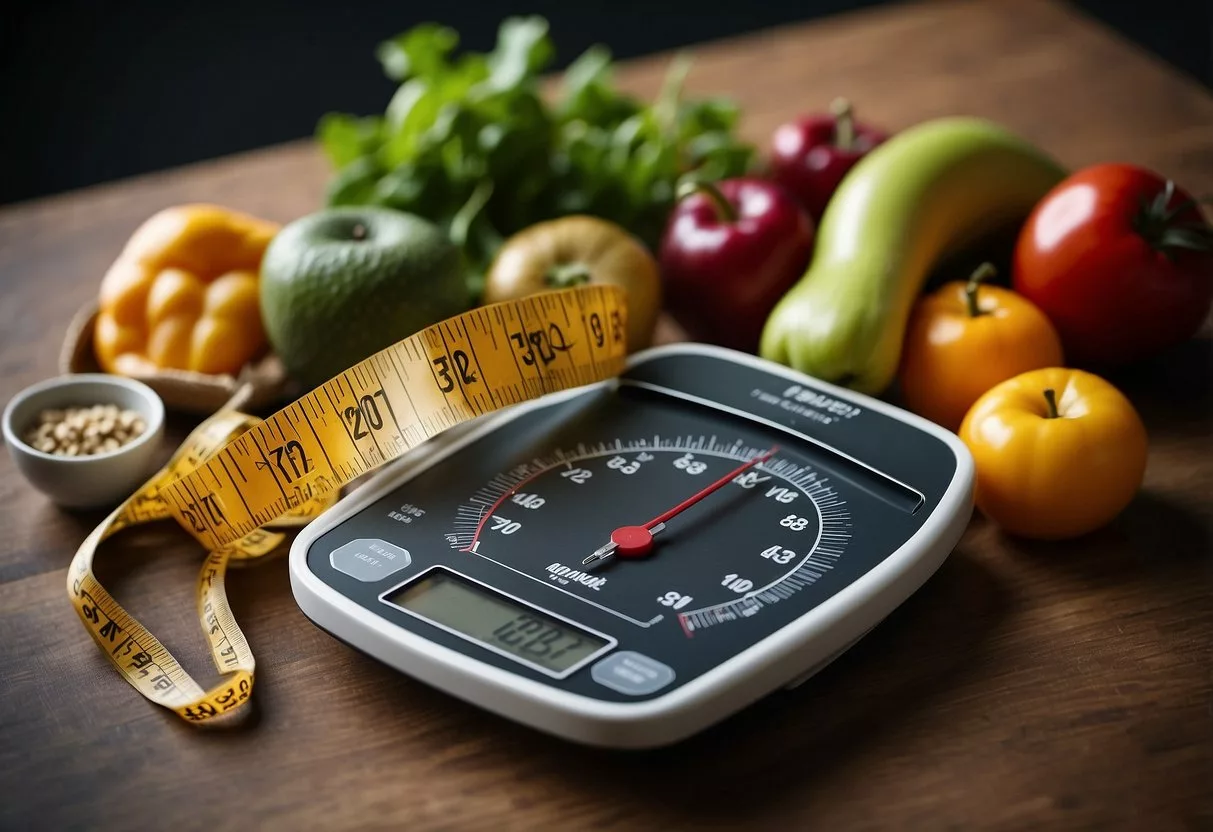
Weight loss with insulin resistance can be challenging. These questions address key strategies for diet, exercise, and lifestyle changes to help manage insulin resistance and promote weight loss.
What are effective dietary strategies for weight loss with PCOS and insulin resistance?
A low-glycemic diet can be helpful for women with PCOS and insulin resistance[17]. This approach focuses on foods that don’t cause blood sugar spikes.
Eating smaller, more frequent meals throughout the day can also help regulate blood sugar levels. Including lean proteins, healthy fats, and fiber-rich vegetables in each meal is important.
Which exercises are recommended for losing weight when dealing with insulin resistance?
A combination of aerobic exercise and strength training is often recommended. Aerobic activities like brisk walking, swimming, or cycling can help improve insulin sensitivity.
Resistance training with weights or bodyweight exercises can build muscle mass. More muscle helps the body use glucose more effectively.
How can one modify their diet to enhance insulin sensitivity and promote fat loss?
Reducing intake of refined carbohydrates and added sugars is crucial. These foods can cause rapid blood sugar spikes and worsen insulin resistance.
Increasing fiber intake through vegetables, fruits, and whole grains can slow digestion and help stabilize blood sugar levels. Adding healthy fats[5] from sources like avocados, nuts, and olive oil can also improve insulin sensitivity.
What are the top foods to include in a meal plan for reducing insulin resistance?
Leafy greens like spinach and kale are excellent choices. They’re low in calories and high in nutrients that support insulin function.
Fatty fish like salmon provides omega-3 fatty acids, which can improve insulin sensitivity. Berries, particularly blueberries, contain antioxidants that may help reduce insulin resistance.
Can you suggest a structured meal plan that caters to insulin resistance weight loss goals?
Breakfast: Vegetable omelet with whole grain toast and avocado.
Lunch: Grilled chicken salad with mixed greens, vegetables, and olive oil dressing.
Dinner: Baked salmon with roasted broccoli and quinoa.
Snacks: Greek yogurt with berries, or a small handful of nuts.
What lifestyle changes contribute to overcoming insulin resistance and achieving weight loss?
Getting adequate sleep is crucial. Lack of sleep can worsen insulin resistance and make weight loss harder.
Stress management through techniques like meditation or yoga can help. Chronic stress can increase cortisol levels, which may contribute to insulin resistance.
Staying hydrated by drinking plenty of water throughout the day can support metabolism and help control appetite.
References
- Sugar Defender. https://8e81c8fyct2y4n4c8aiki8qmct.hop.clickbank.net/?tid=wlir1 Accessed October 31, 2025
- Sugar Defender. https://8e81c8fyct2y4n4c8aiki8qmct.hop.clickbank.net/?tid=wlir2 Accessed October 31, 2025
- Sugar Defender. https://8e81c8fyct2y4n4c8aiki8qmct.hop.clickbank.net/?tid=wlir3 Accessed October 31, 2025
- The Metabolic Syndrome Program: How to Lose Weight, Beat Heart Disease, Stop ... - Karlene Karst. https://books.google.com/books?hl=en&lr=&id=DYRyfyfTD9YC&oi=fnd&pg=PR3&dq=How+to+lose+weight+with+insulin+resistance&ots=GS3Lex2aBG&sig=mo-6lE8tPlAJgkBwY1-D60klxXE Accessed October 31, 2025
- Just a moment.... https://journals.physiology.org/doi/full/10.1152/physrev.00063.2017?gh_jid=4745325003 Accessed October 31, 2025
- Insulin and Insulin Resistance. https://www.ncbi.nlm.nih.gov/pmc/articles/PMC1204764/ Accessed October 31, 2025
- Just a moment.... https://www.tandfonline.com/doi/abs/10.3810/pgm.2010.01.2110 Accessed October 31, 2025
- Update on the effects of physical activity on insulin sensitivity in humans. https://bmjopensem.bmj.com/content/2/1/e000143.abstract Accessed October 31, 2025
- Just a moment.... https://jamanetwork.com/journals/jama/article-abstract/1107991 Accessed October 31, 2025
- Just a moment.... https://www.tandfonline.com/doi/abs/10.2147/DMSOTT.S13860 Accessed October 31, 2025
- Just a moment.... https://www.ahajournals.org/doi/abs/10.1161/CIRCULATIONAHA.111.039453 Accessed October 31, 2025
- ScienceDirect. https://www.sciencedirect.com/science/article/pii/S0016508507005781 Accessed October 31, 2025
- Just a moment.... https://www.nejm.org/doi/abs/10.1056/NEJM199411033311803 Accessed October 31, 2025
- Just a moment.... https://diabetesjournals.org/care/article-abstract/29/1/161/24410 Accessed October 31, 2025
- Just a moment.... https://onlinelibrary.wiley.com/doi/abs/10.6064/2012/424780 Accessed October 31, 2025
- Polycystic Ovary Syndrome in Insulin-Resistant Adolescents with Obesity: The Role of Nutrition Therapy and Food Supplements as a Strategy to Protec.... https://www.mdpi.com/2072-6643/13/6/1848?furriel=07223007d0607aeff3ac066f3fb7a891ee2eb216 Accessed October 31, 2025
- Just a moment.... https://www.annualreviews.org/content/journals/10.1146/annurev.nutr.24.012003.132155 Accessed October 31, 2025
